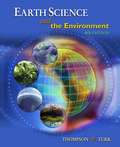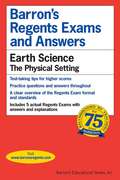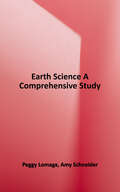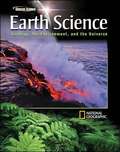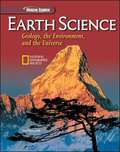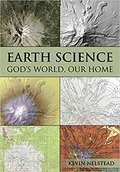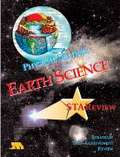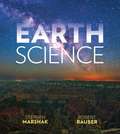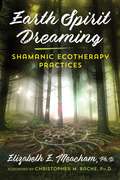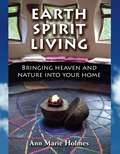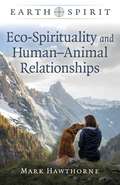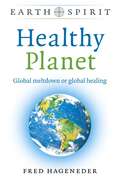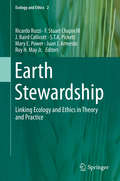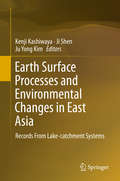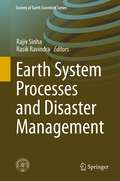- Table View
- List View
Earth Science [Grade 3] (National Geographic Science Ser.)
by Randy Bell Malcolm B. Butler Kathy Cabe TrundleNIMAC-sourced textbook
Earth Science and Applications from Space: A Midterm Assessment of NASA's Implementation of the Decadal Survey
by Committee on the Assessment of NASA's Earth Science ProgramUnderstanding the effects of natural and human-induced changes on the global environment and their implications requires a foundation of integrated observations of land, sea, air and space, on which to build credible information products, forecast models, and other tools for making informed decisions. The 2007 National Research Council report on decadal survey called for a renewal of the national commitment to a program of Earth observations in which attention to securing practical benefits for humankind plays an equal role with the quest to acquire new knowledge about the Earth system. NASA responded favorably and aggressively to this survey, embracing its overall recommendations for Earth observations, missions, technology investments, and priorities for the underlying science. As a result, the science and applications communities have made significant progress over the past 5 years. However, the Committee on Assessment of NASA's Earth Science Program found that the survey vision is being realized at a far slower pace than was recommended, principally because the required budget was not achieved. Exacerbating the budget shortfalls, NASA Earth science programs experienced launch failures and delays and the cost of implementing missions increased substantially as a result of changes in mission scope, increases in launch vehicle costs and/or the lack of availability of a medium-class launch vehicle, under-estimation of costs by the decadal survey, and unfunded programmatic changes that were required by Congress and the Office of Management and Budget. In addition, the National Oceanic and Atmospheric Administration (NOAA) has made significant reductions in scope to its future Earth environmental observing satellites as it contends with budget shortfalls. Earth Science and Applications from Space: A Midterm Assessment of NASA's Implementation of the Decadal Survey recommends a number of steps to better manage existing programs and to implement future programs that will be recommended by the next decadal survey. The report also highlights the urgent need for the Executive Branch to develop and implement an overarching multiagency national strategy for Earth observations from space, a key recommendation of the 2007 decadal survey that remains unfulfilled.
Earth Science and the Environment (Fourth Edition)
by Graham R. Thompson Jon TurkUsing two themes, earth systems and environmental issues, EARTH SCIENCE AND THE ENVIRONMENT provides a rich overview of all Earth-related disciplines, including geology, meteorology, hydrology, oceanography, and astronomy. The authors provide a sense of how Earth functions as a single system composed of interacting subsystems and integrates coverage of enviromental issues in both the authoritative narrative and stunning multi-part visuals that emphasize the beauty of Earth science. To further enrich your experience, this earth science textbook is fully integrated with the CengageNOW online tutorial system. Web-based, assessment-driven, and completely flexible, the system provides you with a personalized learning plan based on a diagnostic pre-test to maximize your study time by focusing your attention where it is needed most.
Earth Science, The Physical Setting (Barron's Regents Exams And Answers)
by Edward J. DeneckeThis edition includes the most recent Earth Science Regents tests through August 2017. These ever popular guides contain study tips, test-taking strategies, score analysis charts, and other valuable features. They are an ideal source of practice and test preparation. The detailed answer explanations make each exam a practical learning experience.
Earth Science-A Comprehensive Study The Physical Setting
by Amy Schneider Peggy LomagaThis book teaches you how to solve your toughest homework problems. Our resource for Earth Science: The Physical Setting includes answers to chapter exercises, as well as detailed information to walk you through the process step by step. With expert solutions for thousands of practice problems, you can take the guesswork out of studying and move forward with confidence.
Earth Science: Geology, The Environment, and The Universe (Oklahoma)
by Francisco Borrero Frances Scelsi Hess Chia Hui Juno HsuStrong support for reading comprehension makes earth science accessible to all students.
Earth Science: Geology, the Environment, and the Universe
by Dinah Zike Francisco Borrero Gerhard Kunze Stephen Letro Michael Manga Len Sharp Theodore Snow Stephen Leslie Frances Hess Chia HsuNIMAC-sourced textbook
Earth Science: Geology, the Environment, and the Universe
by Dinah Zike Francisco Borrero Frances Scelsi Hess Juno Hsu Gerhard Kunze Stephen A. Leslie Stephen Letro Michael Manga Len Sharp National Geographic Theodore SnowNIMAC-sourced textbook
Earth Science: Geology, the Environment, and the Universe
by Glencoe Mcgraw-HillChallenging, comprehensive and relevant, this textbook combines in-depth presentation with a stunning visual program. Earth Science: Geology, the Environment, and the Universe is a comprehensive program that provides thorough content with a wide variety of engaging laboratory experiences. Relevant connections are highlighted to emphasize an environmental application between the classroom and the contemporary world. Strong support is given to math skills using the content.
Earth Science: God's World, Our Home
by Kevin NelsteadThis world belongs to God, our Father and Creator. As the 24th Psalm states: "The earth is the Lord's and the fullness thereof, the world and all those who dwell therein, for he has founded it upon the seas and established it upon the rivers." God's world is a wonderful and precious gift to us, for it is our home. Adam was placed in the garden of Eden "to work it and keep it." This biblical language (work and keep) means that Adam was to develop the garden so that it would be fruitful, and preserve the garden so that it would always continue to provide a suitable home for human beings and all the other creatures. This charge to Adam from God is often called the Cultural Mandate--a mandate from God for the human race wisely to develop and care for all the gifts we have received, including our minds, skills, communities, technologies, and, of course, the beautiful world God made.
Earth Science: Stareview
by Wayne Garnsey Virginia PagePrepares students for the new standards and the commencement level PS/Earth Science Test. Challenges with content-based, multiple choice, short and extended constructed-response questions. Features process skills activities in information systems, interconnectedness, and interdisciplinary problem solving,. Correlates PS/Earth Science key ideas on Earth dimensions, rocks and minerals, dynamic crust, surface processes, water cycle and climate, astronomy, and environmental awareness. Fosters mastery with practice on four recent tests for practice.
Earth Science: The Earth, The Atmosphere, and Space
by Stephen Marshak Robert RauberThe leading authors in their respective fields--physical geology and extreme weather--Stephen Marshak and Robert Rauber bring years of classroom and research experience to this remarkable new book and media package. The authors' narrative approach to the content and innovative integration of new visual and interactive resources guides students to a clearer, more applicable understanding of the entire Earth System.
Earth Science: The Physical Setting
by Thomas McguireThis book helps students understand the fundamental concepts of earth science and become familiar with the Earth Science.
Earth Spirit Dreaming: Shamanic Ecotherapy Practices
by Elizabeth E. MeachamA guide to co-creating a healing vision for humanity and the Earth through nature-connected shamanic rituals • Explains the Earth Spirit Dreaming process for rebirthing inherent shamanic abilities with dozens of practices in three categories: Earth-connecting practices, Spirit-connecting practices, and Dream-connecting practices • Provides experiential exercises to foster interactions with the intelligences and elemental energies of nature and the Spirit realm, realign you with the rhythms and flow of life, and co-create a healing dream for humanity and all of life on our planet • Contains step-by-step directions for connecting with the light guides of the planet for guidance and healing Humanity has become profoundly disconnected from the web of life on Earth as well as from nature as a whole. In this practical guide, Elizabeth E. Meacham details her field-tested method of shamanic ecotherapy practices to resolve this centuries-long trend toward disconnection. Through these practices, you will learn how to reconnect to Earth&’s systems and help restore health and balance to people and the planet. Translating transformative ideas from visionary environmental thinkers into engaging shamanic rituals for profound spiritual growth, Meacham offers dozens of practices in three categories: Earth-connecting practices, Spirit-connecting practices, and Dream-connecting practices. Building on one another, the exercises open channels to allow you to directly experience the intelligences of the Earth and Spirit realms, rebirth your inherent shamanic abilities, realign you with the rhythms and flow of life, and reclaim your ancestral power for co-creating a healing dream for our species and all of life on our planetary home. Guiding the reader through a progressively deepening journey toward connection with ourselves, each other, and the consciousness of our biosphere, the practices also invite profound mindfulness, as we work to hold a vision of connection with the Earth and Spirit realms, while choosing consciously to focus on joy, beauty, gratitude, love, and healing. Illuminating a shamanic awakening within Western culture at the dawn of an ecological age, Earth Spirit Dreaming reveals how the birth of a global consciousness of healing depends upon our commitment to individual and collective spiritual evolution. Calling us back to our shamanic heritage of a living nature spirituality, this manual offers much needed guidance on the essential journey back to an intimate love of Earth.
Earth Spirit Living
by Ann Marie HolmesEarth Spirit Living is a revolutionary approach to lifestyle design and personal space. Author Ann Marie Holmes, an expert on earth energy systems, reveals that by picking up subtle cues from the natural world, we can create healthy, enjoyable, and sustainable living spaces. She shows how we can effectively incorporate principles of sacred geometry, human intuition, and the power of space, shape, and layout to become aware of -- and collaborate with -- the earth's energies. Perfect for homeowners, renters, business owners, professional designers, and builders, Earth Spirit Living illuminates the benefits of living in cooperation with our environment, including: * a more comfortable home * increased effectiveness in your work * healthier, calmer living conditions * enhanced work and personal relationships * improved prosperity * smoother construction or remodeling process Insightful illustrations, ceremonies, cures, attunements, and visualizations will help you hone your natural instincts and strengthen your connection to your physical space. With client stories and personal anecdotes, Holmes guides you on the journey toward a balanced life and living space that harnesses the energy and wisdom of nature.
Earth Spirit: Eco-Spirituality and Human–Animal Relationships
by Mark HawthorneIn Eco-Spirituality and Human-Animal Relationships Mark Hawthorne examines the all-too-often difficult and exploitative relationship between animals and humans. Eco-spirituality seeks to reassess our relationship with the environment, where humans are understood as not morally superior but rather equal to the life forms with whom we share this planet. Our kinship with animals has perhaps always been fragmented, but it&’s not too late to embrace a new paradigm. For us, for them, and for all life on Earth.
Earth Spirit: Global Meltdown or Global Healing
by Fred HagenederHealthy Planet offers a clear and concise overview of the global ecological crisis that humanity has brought upon itself, and what options we still have to save a benevolent climate, to restore biodiversity, reduce pollution, and heal the ecosphere of this planet, including ourselves. Since well before the Covid-19 crisis the United Nations have been emphasizing that only a healthy planet can support healthy people. The degradation and pollution of nature also poisons our own bodies. Climate breakdown and the global loss of biodiversity also threaten the human species. But what is a "healthy planet"? How does it work, how much do we disrupt the planet&’s life support systems, and what changes are overdue? We have all the necessary means at our disposal, though just patching up the worst symptoms won&’t do anymore, we have to address the underlying causes, including our habits, values, and paradigms. We are at a crucial crossroads, and time is running short. If we act fast enough, a dignified and truly sustainable healthy future awaits.
Earth Stewardship
by J. Baird Callicott F. Stuart Chapin III Ricardo Rozzi Juan J. Armesto S.T.A. Pickett Mary E. Power Roy H. May Jr.This book advances Earth Stewardship toward a planetary scale, presenting a range of ecological worldviews, practices, and institutions in different parts of the world and to use them as the basis for considering what we could learn from one another, and what we could do together. Today, inter-hemispheric, intercultural, and transdisciplinary collaborations for Earth Stewardship are an imperative. Chapters document pathways that are being forged by socio-ecological research networks, religious alliances, policy actions, environmental citizenship and participation, and new forms of conservation, based on both traditional and contemporary ecological knowledge and values. "The Earth Stewardship Initiative of the Ecological Society of America fosters practices to provide a stable basis for civilization in the future. Biocultural ethic emphasizes that we are co-inhabitants in the natural world; no matter how complex our inventions may become" (Peter Raven).
Earth Surface Processes and Environmental Changes in East Asia
by Kenji Kashiwaya Ji Shen Ju Yong KimThis book examines relationships between climate-hydrological changes and other phenomena including land use and natural disasters during the Holocene and recent past. In particular, periods of rapid climatic shifts such as global warming and global cooling are examined through paleohydrological and other studies of various lake-catchment systems in East Asia, from Mongolia in the north to Taiwan in the south. A number of different research techniques are used in the work presented here, including sediment analysis and optically stimulated luminescence dating and the reader learns how the lake-catchment system functions as a "proxy observatory" for past and present environmental monitoring. The lake catchments studied by the authors of this volume are under similar climatic conditions, i. e. , under the East Asia monsoon, with some systematic difference in climatic factors. Both proxy and observation data are available for the surrounding countries' provisions against natural disasters that are related to climate-hydrological events and readers will see how present instrumental observation data can be connected to past proxy data (sediment information) in the system.
Earth System Processes and Disaster Management
by Rajiv Sinha Rasik RavindraOne of the fundamental goals of earth system science research is to adopt a more holistic view of the earth as a 'system' comprising different domains. The Society of Earth Scientists has brought out this multidisciplinary publication to emphasize the need of an integrated approach to understand the Earth system. It focuses on natural disasters and, in particular, on climate change and its effects in Asia and understanding the significance of these developments within the context of the paleo-climatic record. The later sections of the book then focus on other types of natural disasters as well as those induced by human interaction with our environment.

